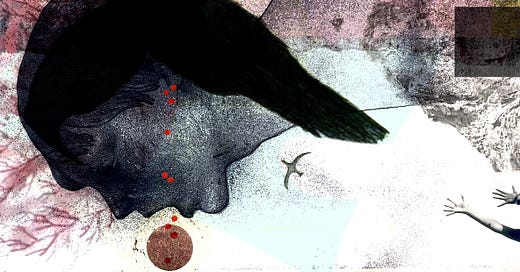The membranes of my walls
On sisters, silence, and the exhausting work of interrupting the lineage of harm.
Few things are more painful—or more confusing—than the quiet violence of intergenerational rupture.
Many bloodlines, especially those shaped by trauma, colonization, displacement and patriarchy survive by demanding loyalty over health. In those systems, boundaries are seen as abandonment and abuse is recoded as «this is how we love in our family».
Cutting contact in such a context might look like rejection. I used to think that. But it is not. You are not severing love; you are refusing to let love be defined by harm. It is a ritual of differentiation.
I have cut contact with my sister.
Over and over again. Cutting, thinking it over, understanding more and more, excusing, forgiving, mending, connecting again…
Repeat.
I’ve spent years trying to understand this apparent break in the lineage—while also soothing the ghost that whispers I’ve failed in my healing role. That I’m supposed to hold space for everyone. That this rupture is somehow a betrayal.
I clearly see today that this is probably what I have been trying to do with all my heart and my energy; interrupt a repetition. This is turning to be my life time enterprise. And this is exhausting.
Repeat.
To interrupt a family system—especially one shaped by harm—is often experienced as betrayal. You grow tired. You feel alone. You begin to wonder if the rupture is the problem, or if you are.
A relationship that is emotionally draining and abusive - specially when it is birthed in your own home - your sister trained by your mother - your mother trained by her own mother … creeps into your body in many ways. It forms a living residue. A sticky, ancestral feeling-memory that lodges in muscle, voice, skin, gut.
It attunes your nervous system into constant alert. You are shaped by invisible loyalties. The family systems theorist Ivan Boszormenyi-Nagy, who coined the term, pointed to how unconscious loyalties—to suffering, exclusion, silencing, or sacrifice—get passed down across generations often as acts of love.
These are not moral failures.
They are misguided generosities, where a descendant tries to redeem a pain that predates them.
My relationship with my sister has always been complicated, shaped by unspoken dynamics and unresolved pain. From early on, I was placed in the role of caretaker—not just for my mother, but for my sister too. She was younger, more fragile, and emotionally dependent. I protected her, structured things for her, and made space for her needs, often at the cost of my own.
But as we grew older, our relationship became increasingly strained. She struggled to stand on her own, and I found myself repeatedly stepping in, trying to stabilize what felt unstable. Over time, her words and behaviour toward me - and now toward my mother too - became hurtful and abusive. I tried to say no. I tried to set boundaries. But I often ended up softening, letting her back in, hoping things would be different.
Eventually, I had to make the difficult decision to stop contact. This wasn’t about punishment. It was about survival—mine and perhaps hers too. Still, the guilt lingered. I wondered if I had failed her. I wondered what it meant, as a therapist, to advocate for understanding while cutting off someone from my own lineage. I asked myself what the consequences might be—for the system, for the generations to come.
What do we owe to blood when blood calls us to betray ourselves?
Exploring the tensions between responsibility and freedom, loyalty and self-preservation is complex. What does it means to break a pattern without breaking relationship? Is it even possible? There are deeper family stories that shaped our rivalry—stories of maternal abandonment, unequal caregiving, and generational wounds passed down through the women in our line.
Can that wound ever be healed?
What happens when the sibling bond becomes a battlefield?
What kind of repair is possible when the rupture runs deep?
I have no answers. I just offer questions.
At the end of the day, a system which feeds itself and functions from within a frame of harm and shame and abuse do not easily forgive those who refuse the pattern. They will not name your refusal as strength. They will name it as betrayal. But still…





Family relationships can be so many things... and patterns do repeat, don't they. Sending heart energy your way, Sage. I value your openness - I feel less alone knowing there are others that endure similar experiences.
I love you, dear soul sister